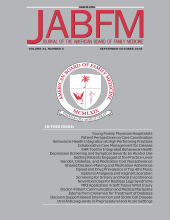To the Editor: I just returned from my state Academy of Family Physicians annual meeting. I noted that time and again the moderators would introduce a speaker as a “diplomat” of the American Board of Family Medicine (ABFM).
In general, a diplomat is an individual who uses skill and tact in dealing with other persons (which physicians certainly do), and this designation usually describes an ambassador appointed to represent a government in its relations and dealings with other governments. To the uninitiated, then, a “diplomat” of the ABFM would have about the same status as a public relations specialist.
A “diplomate,” however, as defined by the American Heritage Dictionary of the English Language1 is “one who has received a diploma, especially a physician certified as a specialist by a board of examiners.” As ABFM diplomates, we demonstrate to our colleagues that we have acquired a broad body of medical knowledge through intensive examination by a national board of senior family medicine specialists. However, do our patients understand what “diplomate” status means? How many of our political leaders appreciate the significance of the title of diplomat?
I submit that the above is much more than a mere matter of semantics and has significance in a much larger context, not only in the delivery of primary health care but also in shaping health care policy. It is entirely possible for non-board-certified family medicine physicians to practice, albeit perhaps with some possible restrictions on issues like insurance participation and medical staff membership. However, the family medicine physician who has pursued and earned diplomate status has demonstrated a dedication to scholarship and expertise in the practice of our discipline. Simply put, diplomate status shows a personal commitment to excellence, and every ABFM diplomate knows what rigorous requirements his or her fellow diplomates had to meet to earn the title. However, many among the general public and important decision makers in the political leadership very well may not appreciate exactly what ABFM diplomate status entails. By clarifying their understanding of the significance of ABFM diplomate status, I believe that we enhance our credibility in contributing to the discussion of these critical issues.
Considering the current discussions for use of midlevel providers to assume an ever larger role in delivery of primary care2,3, if the specialty of Family Medicine is to succeed and thrive in the future it is critical for family medicine physicians to assertively define and defend our role in the health care delivery arena and to enlist allies. Thus, as diplomates of the ABFM, each of us must to educate our patients, the public, and legislators about the unique qualifications of the board-certified family medicine physician as distinguished from other primary health care providers. Midlevel providers play an important role in health care delivery, but this complements—is does not replace—the physician. The knowledge base and skill set developed through medical school and residency training and manifested by attainment of diplomate status set the board-certified family physician apart.
In addition, it is essential for us as family medicine physicians to assume a more active role in advising and shaping the reform of the health care system. Passionate, board-certified family medicine physicians are among the best qualified to help guide this task and ensure the process is focused on patients and centered around primary care. The insight that family physicians are equipped to bring to this process are important to help reduce the administrative and regulatory burdens that add to health care costs and take time away from patient care, reform medical liability laws, reduce the costs of pharmaceutical therapy, and assist in making primary and preventive care and mental health and substance abuse services more readily available to patients.
All family physicians can attest that our discipline is currently buffeted by numerous pressures from within and without: the Medicare Access CHIP Reauthorization Act, with its associated reporting requirements; the impact of noncompliant patients on quality metrics tied to compensation; increases in prior authorization requirements for testing and therapy; negotiations with payers; patient satisfaction scores; increased time spent on administrative and documentation tasks; maintenance of certification; and numerous other forces affecting our daily practices. Coupled with the debate regarding changes in health care delivery and policy, as noted earlier, it is understandable that many family physicians are questioning what the future of our discipline will be.
Several years ago representatives from numerous family medicine organizations convened to define the role of family physicians in order to establish a clear identity for our specialty in the future:
“Family physicians are personal doctors for people of all ages and health conditions. They are a reliable first contact for health concerns and directly address most health care needs. Through enduring partnerships, family physicians help patients prevent, understand, and manage illness, navigate the health system, and set health goals. Family physicians and their staff adapt their care to the unique needs of their patients and communities. They use data to monitor and manage their patient population, and use best science to prioritize services most likely to benefit health. They are ideal leaders of health care systems and partners for public health.”4
By adopting the role definition described above as our mission statement and promoting the unique qualifications and perspective that Family Medicine brings to current discussions of primary health care delivery and health care policy, we position our discipline for a leadership role in our national health care system.
Notes
To see this article online, please go to: http://jabfm.org/content/31/1/166.full.







